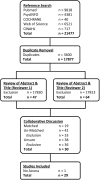WHO guidance on mental health training: a systematic review of the progress for non-specialist health workers
- PMID: 30782724
- PMCID: PMC6361333
- DOI: 10.1136/bmjopen-2018-024059
WHO guidance on mental health training: a systematic review of the progress for non-specialist health workers
Abstract
Objective: To assess existing literature on the effectiveness of mental health training courses for non-specialist health workers, based on the WHO guidelines (2008).
Design: A systematic review was carried out, complying with the Preferred Reporting Items for Systematic Reviews and Meta-Analyses checklist.
Data sources: After examination of key studies in the literature, a comprehensive search was performed within the following electronic databases on 31 May 2017: PubMed, PsycINFO, CINAHL (using EBSCOHost interface), Cochrane, Web of Science.
Eligibility criteria: Searches were conducted for articles published in English from January 2008 to May 2017, using search terms related to mental health, training, community care and evaluation/outcome, following the Participants, Interventions, Comparators and Outcomes process for evidence-based practice.
Outcomes: Data were collected across the following categories: trainees (number and background), training course (curriculum, teaching method, length), evaluation method (timing of evaluation, collection method and measures assessed) and evaluation outcome (any improvement recorded from baseline). In addition, studies were assessed for their methodological quality using the framework established by Liu et al (2016).
Results: 29 studies with relevant training courses met the inclusion criteria. These were implemented across 16 countries since 2008 (over half between 2014 and 2017), with 10 in three high-income countries. Evaluation methods and outcomes showed high variability across studies, with courses assessing trainees' attitude, knowledge, clinical practice, skills, confidence, satisfaction and/or patient outcome. All 29 studies found some improvement after training in at least one area, and 10 studies found this improvement to be significant.
Conclusions: Training non-specialist workers in mental healthcare is an effective strategy to increase global provision and capacity, and improves knowledge, attitude, skill and confidence among health workers, as well as clinical practice and patient outcome. Areas for future focus include the development of standardised evaluation methods and outcomes to allow cross-comparison between studies, and optimisation of course structure.
Prospero registration number: CRD42016033269.
Keywords: health policy; international health services; medical education and training; mental health; public health; task-shifting and task-sharing.
© Author(s) (or their employer(s)) 2019. Re-use permitted under CC BY-NC. No commercial re-use. See rights and permissions. Published by BMJ.
Conflict of interest statement
Competing interests: None declared.
Figures
References
-
- World Health Assembly. Global burden of mental disorders and the need for a comprehensive, coordinated response from health and social sectors at the country level: report by the Secretariat. Geneva: World Health Assembly, 2012.
-
- World Health Organization. Mental health action plan 2013-2020. Geneva: World Health Organization, 2013.
Publication types
MeSH terms
LinkOut - more resources
Full Text Sources
Medical
Miscellaneous


